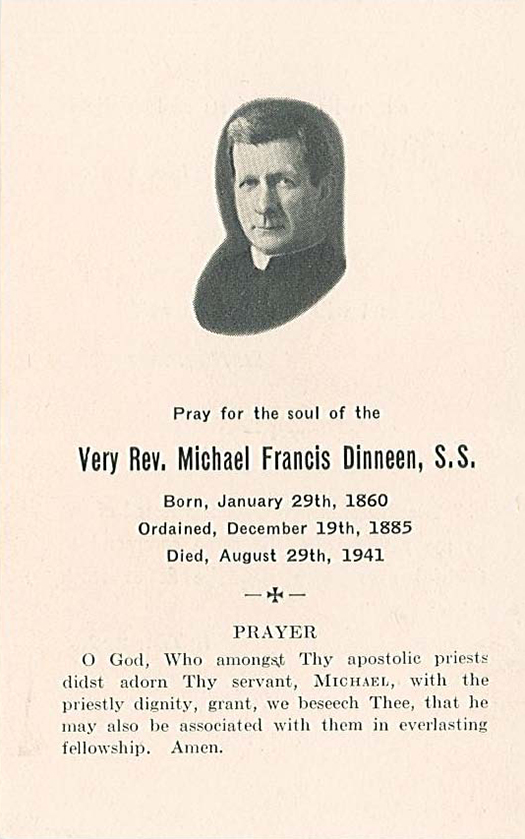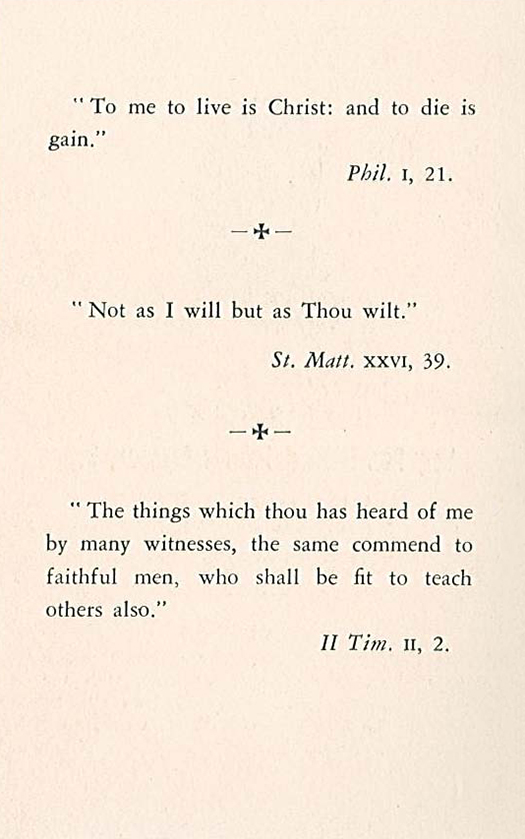Dinneen, Father Michael
1941, August 29
Date of Birth: 1860
Issy
December 7, 1943
Fathers and Dear Confreres:
In order to make up for the involuntary delay that I have taken in sending on to you the customary notices on the confreres whom God has called to Himself, I want to recall in this circular letter the religious and moral traits of Fathers Périsse, Girot, Portier, Dinneen, and Farrell, who belonged to the three provinces of France, Canada, and the United States. You will not be surprised at the brevity of these notices. Present conditions have not permitted us to obtain on each of our deceased – except the first – information which is ordinarily sent to us on the life and death of Sulpicians whom the good God has admitted to eternal life. I must then rely on my own memories of them. . .
† † †
Father Dineen – Michael Dinneen was a priest of the Diocese of Richmond in the State of Virginia in the United States. Most likely, he was born in that diocese in 1860. In 1882 he entered St. Mary’s Seminary in Baltimore.
In 1885 he was ordained priest. What functions did he fulfill in his diocese during the first fourteen years of his priesthood? We have no information on that matter. It seems likely that he went to study at some university, perhaps St. Mary’s in Baltimore, for he was a Doctor of Theology.
Of his seminary and his studies Michael Dinneen had kept a fond memory, and an even fonder one of his life with the priests of St. Sulpice. So in 1899, no doubt at the request of Father Magnien, he left his diocese with the consent of his bishop and became a teacher of Philosophy at our Baltimore house. We do not know if he had other teaching assignments in the same house before being teacher of Moral. What we can be sure of is that in 1905, on the recommendation of Father Dyer, he was admitted to the Society by Father Garriguet.
Very quickly Father Dinneen became one of the confreres most prominent at St. Mary’s Seminary and in the United States. He must for some years have taught at the major seminary in Boston, for on several occasions there was, in the course of canonical visitations in our American houses – from former students of that diocese – question of him. But our confrere spent the greatest part of his career at St. Mary’s Seminary either at Paca Street (that is, at the original seminary of the Sulpicians) or at Roland Park, otherwise called the new St. Mary’s.
As we have suggested above, Father Dinneen seems to have taught Moral Theology in that house. But that was not all he did. Without mentioning the ministry of [spiritual] direction which he exercised with success – success of the highest order – for many years he was “Directeur du” or, as it is called there, Vice President of St. Mary’s Seminary. It was not a meaningless title. The President was at the same time local superior and Provincial Superior of the United States. In that capacity he had to be away frequently, to make a canonical visitation of the seminaries every three years, especially to make himself available to the Sulpician houses on the Atlantic coast, all of which were not too far from Baltimore.
When the Provincial Superior left St. Mary’s, Father Dinneen replaced him and became for some weeks or some months the superior of the seminary. In exercising the functions of that office – all the more delicate as they were temporary – Father Dinneen always showed himself more than equal to his job. The confreres had the most delicate affection for him; the seminarians all but worshipped him. Now and then, the students could take a little – very little! – advantage of the kindly and rather quiet reserve that the Vice President maintained in their regard, but they respected and admired him in that he exemplified for them the ideal of the American gentleman and the true priest. No one could see Father Dinneen without being filled with respect and veneration for his person. Tall, quite erect he was, his look open and serious, with, from time to time, a slight smile playing on his lips and a twinkle in his eyes. His speech was always calm, winning, sparkling with subtlety. His observations were full of practical sense and always stamped with the purest supernaturalness. When he was questioned, his answers were always courteous, but precise and to the point, never calculated to flatter the questioner nor to put the hearer in his place. In brief, in all his dealings with others, he showed himself a man of great intellectual and moral worth; a priest entirely dedicated to his supernatural mission; a Sulpician thoroughly steeped in our traditions, our spirit of religion, our devotion to the clergy; a confrere who could have held the highest places in our Society and who, besides, might have been considered for this or that delicate assignment. But he himself certainly never had any such notion. His whole being breathed the simplest humility and the most complete forgetfulness of self. He was willing to engage in pleasantry, but his pleasantries respected with infinite delicacy the slightest requirements of charity. And when anyone took the liberty of “attacking’ him in a friendly way, he responded with a smile, happy to take his small part in the joy of the seminarians or in that of his confreres. Of him might have been repeated what was written of Father Brugère: “He loved the seminary and it returned that love.”
Unhappily, age and infirmity obliged Father Dinneen to ask the Provincial Superior of the United States permission to resign his offices. He stayed at the seminary in Roland Park edifying his confreres and the seminarians by his ever attractive goodness and regularity. Some years ago an infirmity common enough in the elderly required that he undergo surgery. That must have been successful, for in 1938 his health seemed very good. One might have thought Father Dinneen capable of resuming his old duties; but in spite of that physical improvement our confrere remained in retirement. In the last news received about him, there was no indication of any uneasiness over his condition. We have learned of his death, but we have not come by any details in that matter. . . .
I recommend to your prayers the souls of all these confreres and the Sulpician houses in which they lived and worked.
Please accept, Fathers and dear confreres, the expression of my respectful and fraternal affection in Our Lord.
P. Boisard
Vice-Superior General of St. Sulpice


